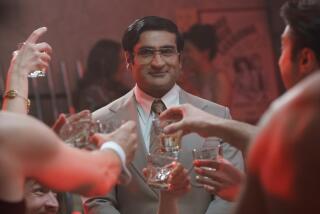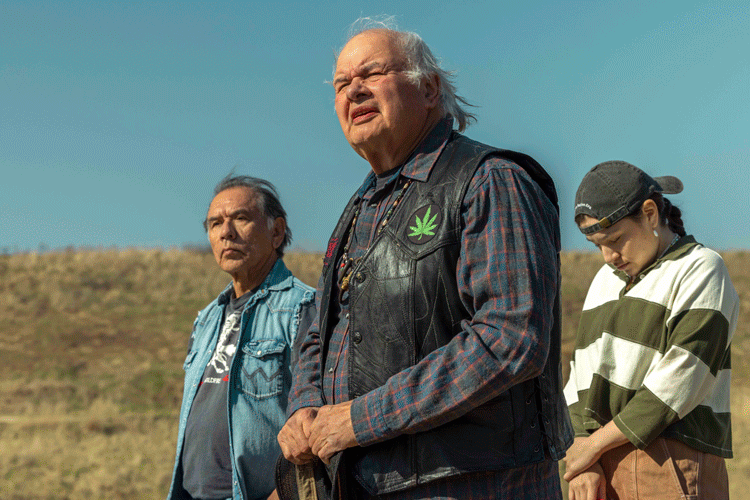CABLE: NEW FRONTIER GROWS UP : Picking Up on ‘Hitchhiker’--Something Different This Way Comes on the Tube
- Share via
VANCOUVER, B.C. — In the first season of Home Box Office’s half-hour anthology series “The Hitchhiker,” production insiders called it “ ‘The Twilight Zone’ with skin.”
The following year, the unofficial slogan was updated when it was noted that the male character typically met his maker right after enjoying one of the show’s trademark sex scenes. It was called “have sex and die.”
Those tongue-in-cheek handles accurately reflect the raw, brooding eroticism of “The Hitchhiker,” which has earned a cult following and become HBO’s most popular series. But they only begin to allude to “The Hitchhiker’s” most striking quality: the ability to put a new face on an old format when the restrictions of commercial TV don’t apply.
It’s a quality found piecemeal elsewhere on pay cable: Showtime’s “Brothers” is a homosexual-themed sitcom; HBO’s “Not Necessarily the News” is even more irreverent than “Saturday Night Live’s” news spoof, and the concept of a computer-generated talk-show host on “Max Headroom,” on the HBO-owned Cinemax channel, might be considered a bit way out for viewers accustomed to Johnny, Joan and Merv.
Even the networks have a glimmer of lessened restrictions this season: Anthology series such as “Alfred Hitchcock Presents,” “The Twilight Zone” and “Amazing Stories” offer a freedom from traditional episodic format and its weekly, by-the-book sameness.
But “The Hitchhiker,” which debuts a new episode every other Wednesday evening, is both racier than network fare and more cynical and intense than most of its cable counterparts. Some typical stories, which open and close with a visit from the roving hitchhiker who gives the series its name:
--A lying womanizer gets his comeuppance from a female video artist who turns his execution into a piece of performance art.
--A man is visited by the ghost of a former girlfriend and forced to re-experience her suicide.
--A drug overdose victim fighting to hang on confronts life, death and his Oedipal urges in a bizarre fantasy.
--A broadcast preacher is visited by a higher authority, who may be the brother he jealously despised.
One of the reasons “The Hitchhiker” seems so unlike most other TV is that its producers, Riff Markowitz and Lewis Chesler, had never produced a dramatic series. Their prior experience was in entertainment specials for HBO.
“I never got a chance to learn the rules,” said Markowitz, 46, who ran away from his Toronto home at 15 to join the circus and eventually stumbled into radio work. “I don’t know how to do anything except the way I know how to do it.”
Chesler, 38, former artistic director of the Long Beach Performing Arts Center, presents a slightly more logistical view of “The Hitchhiker’s” non-network-clone status. “What pay TV permitted was a license that had never been available in television and, candidly, not even in film, because film is subject to market forces,” he said. That license is “primarily in regard to idea,” but also encompasses “language, graphic visual content and presentation of violence.”
Both men deny that “The Hitchhiker’s” frequent display of female breasts and, only slightly less often, lovemaking, are gratuitous. Erotic, yes, but not gratuitous, they say.
“Richard (Rothstein, executive creative consultant) and Riff and I sat around at great length and tried to develop suspenseful stories that were erotically based, because eroticism is an aspect of psychology that has never really been dealt with, particularly given the American puritanical resistance to it,” Chesler said.
Ditto the series’ dark, often violent tone, which the producers saw as offering something new to viewers as well as to writers and directors.
Not insignificantly, NBC Entertainment President Brandon Tartikoff counts himself among the show’s fans. “It’s the kind of storytelling you can do when you don’t have any broadcast standards departments and any restriction on violence, behavior, language or nudity,” he said. Now that NBC, too, is in the anthology business, Tartikoff said that he watches “The Hitchhiker” not only as a viewer, but also “to see if I can learn something.”
On the set here recently, Paul Verhoeven, the Dutch director of such feature films as “Spetters” and the recent sword-and-sex saga “Flesh & Blood,” was directing Peter Coyote and newcomer LaGena Hart. In the episode titled “Last Scene,” to be telecast next year, Coyote plays a manipulative film director and Hart the ingenue who is the subject of his off-camera scare tactics.
There is a twist, of course, that calls into question who’s scaring whom and how many movies within movies we’re really seeing.
“I happen to like that kind of story,” Verhoeven said in thickly accented English. Though he has a Ph.D. in mathematics, Verhoeven has also studied parapsychology and is a fan of what he calls, for lack of a better English word, “the occult,” a genre of storytelling little practiced in Europe.
An even stronger attraction for many directors and actors is that they find “The Hitchhiker” almost as satisfying as making a movie but without the lengthy commitment. “This feels like a film,” Coyote said in between shots at a not-yet-opened Vancouver hotel, the location set for much of “Last Scene.”
A tightly budgeted show, “The Hitchhiker” spends about $450,000 per episode, 72.4% of which comes from HBO. The show has grown since 1983. This season some episodes--including “WGOD,” which stars Gary Busey and can be seen Friday at 10:30 p.m.--have barely a trace of sex or nudity, though the hard edge remains.
“What we have done this year, which I think is fairly significant, is we have tampered with success,” said Bridget Potter, senior programming vice president for HBO and Cinemax. “We had a successful show we weren’t completely satisfied with and we collaborated with the producers to reach a new level of director, writer and actor.”
By the end of this season, a total of 26 episodes will have been completed. Markowitz and Chesler already are negotiating for syndication rights.
Markowitz sees no irony in a show that seems to be a success precisely because it’s different from commercial TV fare attempting to find its biggest audience on that very medium--albeit with a little editing. “I don’t believe there’s a special kind of show that works on cable or pay TV and doesn’t work on the networks,” he said. “We could take our show and put it on the network--if the network would allow us to.”
More to Read
The complete guide to home viewing
Get Screen Gab for everything about the TV shows and streaming movies everyone’s talking about.
You may occasionally receive promotional content from the Los Angeles Times.






